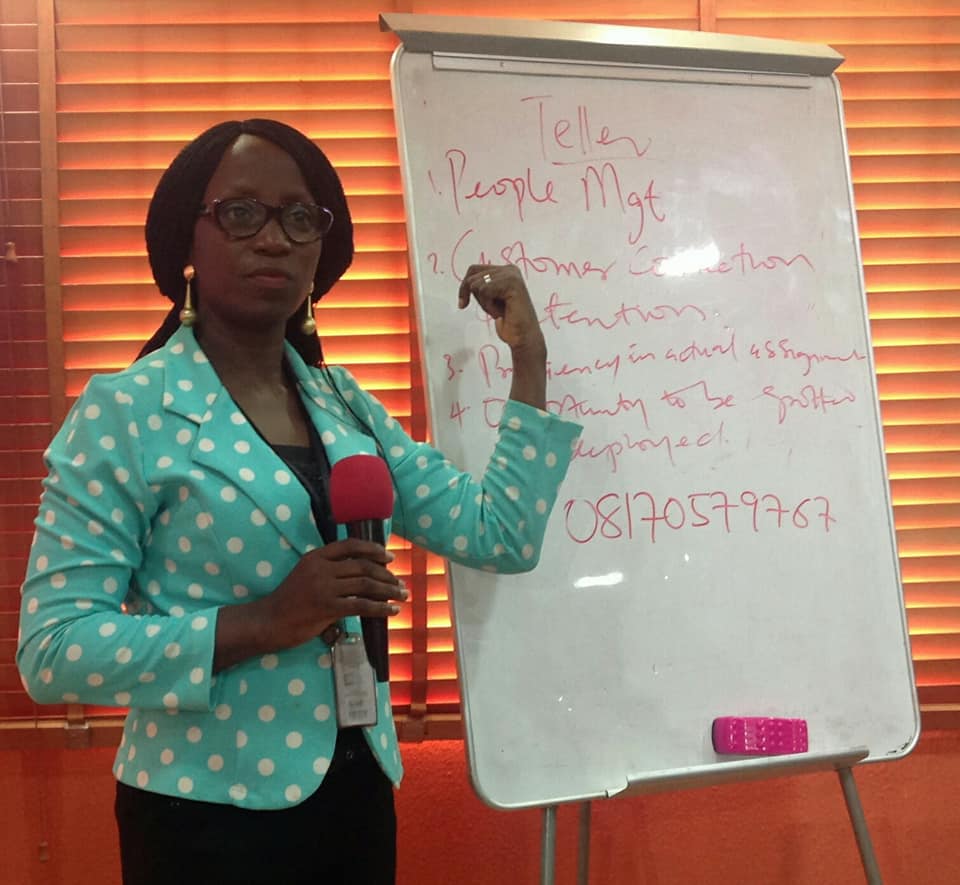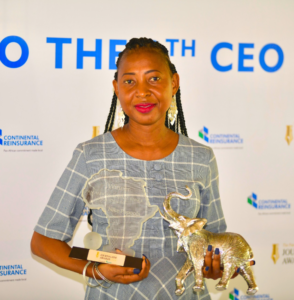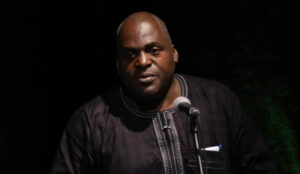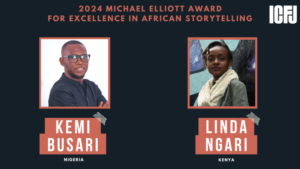Former Senior Correspondent of Punch Newspapers Bosede Olusola-Obasa is now CEO, 1st Royal Character & Values Ltd – a social capital (character) development and management company.
The host of MIND YOUR CHARACTER with Bosede Olusola-Obasa, on Inspiration 92.3fm, Lagos recently marked the first year anniversary of her radio programme.
In this interview with mediacareerng.org, she shares her experience on transiting from being a print journalist to a radio host, Character Development initiatives and advice for journalists in and out of newsrooms.
What has your experience been like considering that you have always being a print journalist?
My experience has been very interesting. Specifically on the ‘MIND YOUR CHARACTER with Bosede Olusola-Obasa’ radio programme; it’s been a great learning adventure.
Besides the radio studio back then in 1996 at the Nigeria Institute of Journalism in Ogba, Lagos, (my school, where I majored in Print Journalism); I had not been to any radio station before. I couldn’t even pass for a keen radio listener.
The first time I would enter a radio studio was April 8, 2017, the day I hosted my show for the first time. Prior to that day, I had had to psyche myself over and again saying things like … “You are a journalist; this shouldn’t be totally alien to you.” “You can do it and all that.” I had looked up my radio/TV production notes and researched. But even after all that was done, I still battled the fright of being on a live programme for the first time alone and conversing with people I couldn’t see but had to believe they were there with me.
My 14 years of journalism suddenly felt like kindergarten. The 30 minutes seemed so long (unlike now that I am considering an extended time). The leeway came that day when the producer on the console notified that I had a caller on the line. Wow!
The discussion of the first day was: How African Is African Time? So I felt rewarded when two callers told the story of how African time had made them lose contracts and firmly discouraged it. That sealed it for me. Still frightened, but keep up courage, I wondered if the callers had been waiting with those apt stories to buttress the discussion of the day. I went home very happy. And since then, I haven’t stopped turning up to host the show. I thank God, partner organization (PERTINENCE LTD) and individual volunteers, who have made it very easy for me.
What have you had to learn to make the programme a success?
A lot, as I earlier mentioned, it was an unfamiliar terrain for me but the greatest knowledge that came across just before I started was from an old school note of mine that I consulted in my library – it helped me see that radio must be conversational, that I had to be at relaxed with my audience as if I was talking to a familiar person on telephone. Then I started to practice doing that and felt more relaxed per show. Again from that note, I found that it was okay to have my programme scripted. I won’t like to lose my thought lines on air so this helped me. I found that I could either make it a partial or full script … that was good help for me.
I had thought that there would be some form of prepping for me by the pros in the radio station that I had signed up with, but I was very wrong. I had no provision for that because it is an independent programme! It was too late to go back and I had to go on. One thing I haven’t stopped doing is insisting that some trained ears and ardent radio listeners followed the show weekly; so after each show, I ask them how that went and they do the critique.
Again, on Mondays during our strategic business meetings at 1st Royal Character & Values Limited, my team and I review the preview show and note areas of improvement.
Testimonials of value addition, personal effectiveness and public enlightenment; just like our catch phrase goes … we leave our listeners better than we met them. Among high points of the programme is that within this short time, not only am I learning the ropes so fast, I have also started building ‘sit in’ presenters, who anchor the show whenever my schedule can’t allow me to be on the show.
However, we have a very strong quality assurance system, as script for each show is vetted before going live. Again, we have been able to leverage on social media platforms (specifically www.facebook/rcv-characterdevelopment.com), to create a wider following for the show. So, people are not limited by the fact that it’s an FM station, they can join us online real time as we stream live. The show now enjoys very high call-ins from listeners and it can only get better.
Financially, it is still more of investing into the project, but we hope to attract more adverts and partnership going forward.
How has the radio programme enhanced your Character Development initiative?
In many great ways; although it is true that proficiency in the use of social media platforms ranks better in giving exposure to initiatives such as ours, however, the radio medium still attracts a vast majority because of its ‘on the go’ nature. You don’t have to leave what you are doing to listen to a programme on the radio, if you must.
Our programmes have enjoyed patronage using the radio programme. We currently have followers in thousands that we have never and may never meet.
We currently have followers in thousands that we have never and may never meet. We get post show calls to make enquiries about some of our brands and offerings. Being on radio also gives a personality boost to our team and organisation, faster than we would have if we didn’t have that option. However, it is just the beginning.
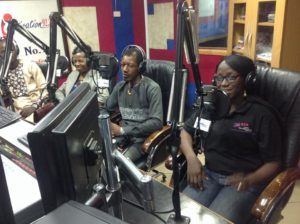
How has your journalism background helped in sustaining the Character development project?
Oh, my background as a journalist is one added advantage I would talk about any day; however, more important. Perhaps is the opportunity of where I practiced the trade – PUNCH Newspapers. The type of superiors I encountered and how they inspired me, most times without even knowing so.
I must however be quick to mention that my positive attitude to whatever I am doing per time has been the underlying factor. Before I started the social capital (character) development and management project, I had never heard of a company specializing in that area before. So when I got the inspiration to pursue this cause, the first thing I did was to embark on fact finding – research.
I needed to know the viability of the idea and how relevant it was to Nigeria. That was no doubt part of my journalism skill, because over the years, I had learnt to dig into and around any idea I wanted to pursue. Going forward, my journalism training kept paying off in meeting people and enjoying goodwill. From writing letters of proposals to corporate organisations for training and all, I have never needed to bring someone in to craft any official correspondence for our organisation; I simply drew from the wealth of experience and adapted it to suit the need per time. In my particular case, I had what some people might call unstable seasons at times in my 14 years at PUNCH. But for me, everything in life rises or falls on perspectives, so rather than complain of being move from beat to beat too frequently, I saw it as an opportunity to become versatile.
It would interest you to know that I communicate with people across different sectors of the economy in facilitating in house trainings for team members and management of corporate organisations and I confidently speak their language. I’m at home with most systems because of the exposure that journalism (reporting) gave me.
What is your assessment of journalism practice in Nigeria from the perspective of a Character development expert?
The word expert is heavy to swallow. Character development is relevant to every area of life, every field of practice or profession. In fact, there are Dominantly Needed Attitudes (DNA) for every profession; that’s how the codes of ethics are coined.
But, there is difference between having a code and having people who subscribe to it. For a journalist, irrespective of the beat he covers, he is called the fourth estate of the realm. His DNA is to be unbiased, objective, trustworthy, selfless, etc. But you see, you cannot force anyone to be who you believe they should be and that’s why rules are there to guide.
I believe that we should rather appeal to people’s interest for building a personal brand that their tomorrow would thank them for. One of the most interesting definitions of character is who a person is when he thinks no one is watching. Codes will make people comply where and when they must, but it may not make them self-regulated.
There is no doubt that the need to make ends meet has not allowed many of our colleagues to stand for what they know to be right. Deprivation tempts, people should work and earn the agreed pay; that’s integrity on the path of employers in the media industry. Staff members should adopt the principle of looking at the end of the journey before embarking on it.
A profound quote by Billy Graham puts it succinctly, “When wealth is lost, nothing is lost; when health is lost, something is lost, when character is lost, all is lost.” Beyond whatever may have become the norm in our profession, the fact remains that you have a choice what personal reputation you want to build … strong reputation is built on strength of character.
As a reporter, it felt so good to represent PUNCH Newspaper, but I also knew that there was more – I also represent myself and my family. I had a name to protect. I must however thank PUNCH management for making it easy for me because, I was never owed one day wage for the years that I worked there.
That is commendable and our dear media employers should emulate this. To a large extent, the destiny of Nigeria has been committed into the hands of the ‘pen profession’, let’s use it well; let’s leave a worthy legacy.
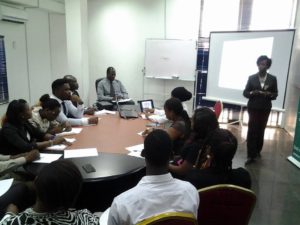
What is your advice for journalists on how to prepare for life outside the newsroom or active journalism practice?
First point is to value the network you are building. Don’t be proud like a soldier, who lives in the barracks and believes he will never have anything to do with the outside world. The reverse of this is don’t be beggarly – respect yourself, your organisation and the profession, don’t hang around people unnecessarily.
Be value oriented. People who you solve problems for as a journalist may solve problems for you tomorrow. I hear people say things like, I don’t get calls again from people since I left the beat I was covering … if you have value to deliver to them once again, they would heed you once again.
Life is about importance and benefits proposition. Are you or your ideas important to the person whose attention you want? Are you or your ideas beneficial to them?
Another point is, amid your busyness; please make out time to think about your exit, except if you know for certain that your future is perpetually guaranteed by staying put in any media house.
If you have a dream to be anything else, please exit when you have the grass green. If you get eased out, it will be too sudden a way to start putting things together. It is always better to leave while ovation is loudest.
Again, please ask yourself vital questions like: Do I know my job’s second hand value? If I am asked to leave after working for at least five years, do I know what to do next from what I have been doing before?
Do I have enough business literacy to build a product or service around the roles that I played every day in my employment? Goodwill is the greatest currency that a journalist gets paid in; it never stops paying you even long after you have disengaged from your employer. Let’s become more intentional professionals.
What other initiatives are you working on to expand your Character development brand?
First is the Royal Character Academy, the flagship brand of RCV; (RCV was incorporated by the corporate affairs commission in 2015).
We package and deliver training to corporate and public organisations eg. Best workplace attitudes, customer attraction and retention attitudes etc; we have modules that help schools integrate character development into their training scheme.
The RCAcademy has an online training option via Skype and whatsapp for individuals. We put our training out through free platforms such as the now quarterly character ambassadors forum.
We do creative writing, copy editing and journal production for excellence under the RCV Media Support arm of our operations. We have books (currently five) on different aspects of character development. We do consultancy … offering informed guide on how to resolve workplace issues including optimised staff welfare thus helping to maximise team spirit for organisations.
Our biggest and free stage annually is the National Character-Parenting Summit, which holds first Saturday of every August. This has enjoyed partnership of notable Nigerians who feature as volunteer panelists.
Some of them are: Professor Pat Utomi, Reverend Moses Iloh, Mrs. Yinka Ogunde, Mrs. Uwa Saleh, Mrs. Moyinoluwa Olutayo, and Professor, Chris Onalo, to mention a few. Talking about being paid in goodwill currency, I met all these persons covering several beats, but never took undue advantage of the relationship. They were glad to be part of our laudable project.
